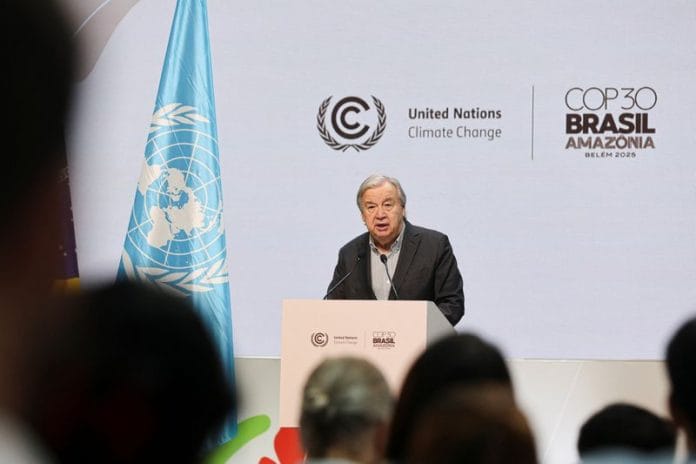By Kate Abnett and Simon Jessop
BELEM, Brazil (Reuters) -United Nations Secretary-General Antonio Guterres appealed on Thursday for a deal from the COP30 climate summit, welcoming calls from some for clarity on the hotly disputed subject of weaning the world off fossil fuels.
The summit in the Amazon city of Belem, Brazil, missed a self-imposed Wednesday deadline to secure agreement among the nearly 200 countries present on issues including how to increase climate finance and shift away from fossil fuels.
“I welcome calls for a just transition mechanism and the growing coalition asking for clarity on the transition away from fossil fuel,” Guterres told a press conference at the summit.
Emissions from burning fossil fuels trap heat in the earth’s atmosphere and are by far the biggest contributor to climate change.
There are less than 48 hours until the scheduled end of the summit to find a consensus, which host nation Brazil has framed as a crucial step to ramping up international climate action and demonstrating that there is broad support to accelerate turning decades of promises and pledges from the COP summits into concrete action.
“One thing is clear, we are down to the wire, and the world is watching Belem,” Guterres said. “I strongly appeal to all delegations to show willingness and flexibility.”
FOSSIL FUEL RIFT
The two-week negotiation has become hung up on two issues – the future of fossil fuels and the delivery of climate finance – that expose criss-crossing fault lines between negotiating blocs from rich Western countries, oil producers and smaller states most vulnerable to climate change.
Taking their cue from Brazil, dozens of countries including both developed and developing nations have mounted a push for a roadmap setting out how countries should transition away from fossil fuels.
Others, including some fossil fuel-producing nations, are resisting – arguing the move would create bureaucracy without improving the commitments that countries have already made to reduce emissions.
The COP28 climate summit in 2023 agreed, after protracted discussion, to a transition, but nations have not mapped out how – or when – it will happen.
“I am perfectly convinced that a compromise is possible,” Guterres added. He said urgent measures are needed to ensure global warming does not permanently break above 1.5 degrees Celsius over pre-industrial times, a threshold that scientists say would unleash a cascade of devastating impacts.
ADAPTING TO CHANGE
Another major sticking point in the negotiations is a reluctance among some richer nations to guarantee financing to help poorer countries adapt to a changing climate, according to three sources involved in the talks.
Developing countries are already deeply mistrustful of a $300 billion climate finance pledge made last year at the COP29 conference in Baku, particularly as the United States withdraws from international climate cooperation under President Donald Trump.
Some existing climate finance has been directed to strange projects, or to projects that are funneling billions of dollars back to rich nations, according to previous Reuters reporting.
“Right now, our people are losing their lives and livelihoods from storms of unprecedented strength which are being caused by warming seas,” said Steven Victor, Minister of Agriculture, Fisheries and the Environment for the Pacific island nation of Palau.
“If we leave Belem without a transformative outcome on adaptation for the world’s most vulnerable, it will be a failure,” he said.
European officials have said they agree adaptation financing is important, but that they were not authorized to agree to new targets.
Sierra Leone’s climate minister, Jiwoh Abdulai, told Reuters that adaptation funding is urgently required to address things like extreme heat, which is becoming a major problem in the West African country’s schools and medical centers.
“Our children are sitting in classrooms that in many industrialized countries would be unacceptable because it’s so hot,” he said.
(Additional reporting by Lisandra Paraguassu, Sudarshan Varadahn, Kate Abnett and William James, Editing by Richard Valdmanis, Andrew Cawthorne and Nia Williams)
Disclaimer: This report is auto generated from the Reuters news service. ThePrint holds no responsibility for its content.






